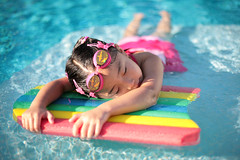
Even when you are right there next to your child to offer comfort, care and treatment, accidents and injuries can be difficult to deal with. So as we prepare our kids to go to summer camp, it is important to ask some questions of the camp and prepare our children well. That way, everyone can rest assured they are having a summer of fun and making memories to last a lifetime in a safe environment.
We’ve discussed many issues parents need to consider when choosing a camp, enrolling their child and sending them on their way on this blog. As parents are making decisions on sending their children to camp next year, here is a list of things to ensure are in place as you get your family ready for a summer away:
- Camp is accredited by the American Camp Association. This requires camps to follow certain guidelines, including counselor to child ratios and other safety procedures.
- Camp requires staff safety training.
- Camp has emergency contact information for your child.
- Camp has been notified of any medical conditions and/or allergies your child has. Be sure to be specific when you communicate with the staff. Let the camp know the specific name of the condition as well as warning signs and steps to take to help your child. Click here for an ACA article on administering medications at camp.

- Camp has provided written health protocols and policies.
Beyond physical safety concerns, ask how the camp deals with homesickness. We’ve talked about that topic on this blog as well and will also be discussing staying connected in an upcoming post.
Just as the camp can have multiple safety policies and procedures for kids, it is also important for our young ones to learn how to stay safe independently. So take the time (repeatedly) to ensure that you and your child
- Know what’s safe and what isn’t. Review the camp’s handbooks for rules of conduct for campers. Review these with your child before he or she leaves for camp.
- Understand which kinds of behavior are acceptable and which aren’t. Breaking the rules can put others in dangerous situations.
- Have good hygiene practices. Cover sneezes and coughs with their elbows (not their hands) and wash hands frequently.
- Know when to notify a staff member and ask for help. Not every bump and bruise requires medical attention – make sure you and your child knows which is which. Camp Starlight has a health center with nurses present and a doctor that is on campus or visits daily.
These are all fairly simple ideas to keep families safe and camp is no different. If, as parents, we do our research, read the parent handbooks and camper manuals, ask all the right questions and talk with our children, everyone spends the summer relaxing, being cared for and as safe as possible. For more information, visit the ACA website and read more about this and other camp topics on their parent pages.
Thanks to Tom@HK and cjc4544 for the photos!
Olivia, Guest Contributor




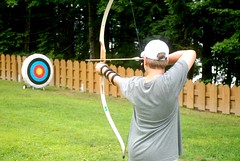 Many families are surprised at the sheer amount of first-time experiences their kids have at summer camp. When Justin, a 12 year old who attended camp this year, was asked to list things he did for the first time at camp, he had quite the list. “I learned how to play guitar, archery, and golf,” he said. During our conversation, it also came out that he also learned new baseball skills and got to play tennis. He also experienced the camp evening programs for the first time, which he raved about as being “fun and creative.” Justin’s going to be talking to a lot of people about camp when he goes back to school. And what is he going to tell them? “I made a lot of new friends and tried a lot of new things. I had the best time!”
Many families are surprised at the sheer amount of first-time experiences their kids have at summer camp. When Justin, a 12 year old who attended camp this year, was asked to list things he did for the first time at camp, he had quite the list. “I learned how to play guitar, archery, and golf,” he said. During our conversation, it also came out that he also learned new baseball skills and got to play tennis. He also experienced the camp evening programs for the first time, which he raved about as being “fun and creative.” Justin’s going to be talking to a lot of people about camp when he goes back to school. And what is he going to tell them? “I made a lot of new friends and tried a lot of new things. I had the best time!”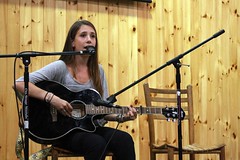 With today’s technology, however, the summer camp community can stay together all year, even when they return to the home cities, states and countries. We have an active Facebook community where current campers, families and alumni can connect, share stories and keep up to date with the staff and the current session. Much of the chatter is about how much everyone misses camp and wishes they were back on the lake, riding the horses, singing in the dining hall, etc. For those who’ve connected to Camp Laurel through
With today’s technology, however, the summer camp community can stay together all year, even when they return to the home cities, states and countries. We have an active Facebook community where current campers, families and alumni can connect, share stories and keep up to date with the staff and the current session. Much of the chatter is about how much everyone misses camp and wishes they were back on the lake, riding the horses, singing in the dining hall, etc. For those who’ve connected to Camp Laurel through 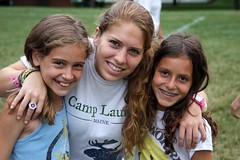
 …do a flip off the Mini-Tramp.
…do a flip off the Mini-Tramp. … flop in the lake…
… flop in the lake… Cabinmates must also learn how to navigate the waters of communal decisionmaking. They must work through the inevitable issues and conflicts that come up in cabin living — and they must learn to adapt and get along when things don’t go their way. They learn to live by the will of the majority, while at the same time respecting the needs of others who represent the minority. Again, according to the
Cabinmates must also learn how to navigate the waters of communal decisionmaking. They must work through the inevitable issues and conflicts that come up in cabin living — and they must learn to adapt and get along when things don’t go their way. They learn to live by the will of the majority, while at the same time respecting the needs of others who represent the minority. Again, according to the 
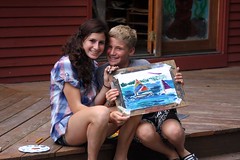


 Making the choice about which length of camp is right for your child is downright easy, especially when it comes to the to the full season camps. For those children who wish to be at camp for the seven weeks, a full-season camp experience can be an extraordinary time in their lives.
Making the choice about which length of camp is right for your child is downright easy, especially when it comes to the to the full season camps. For those children who wish to be at camp for the seven weeks, a full-season camp experience can be an extraordinary time in their lives.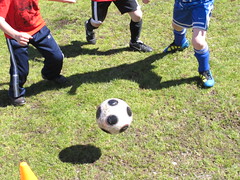

 The Bottom Line
The Bottom Line